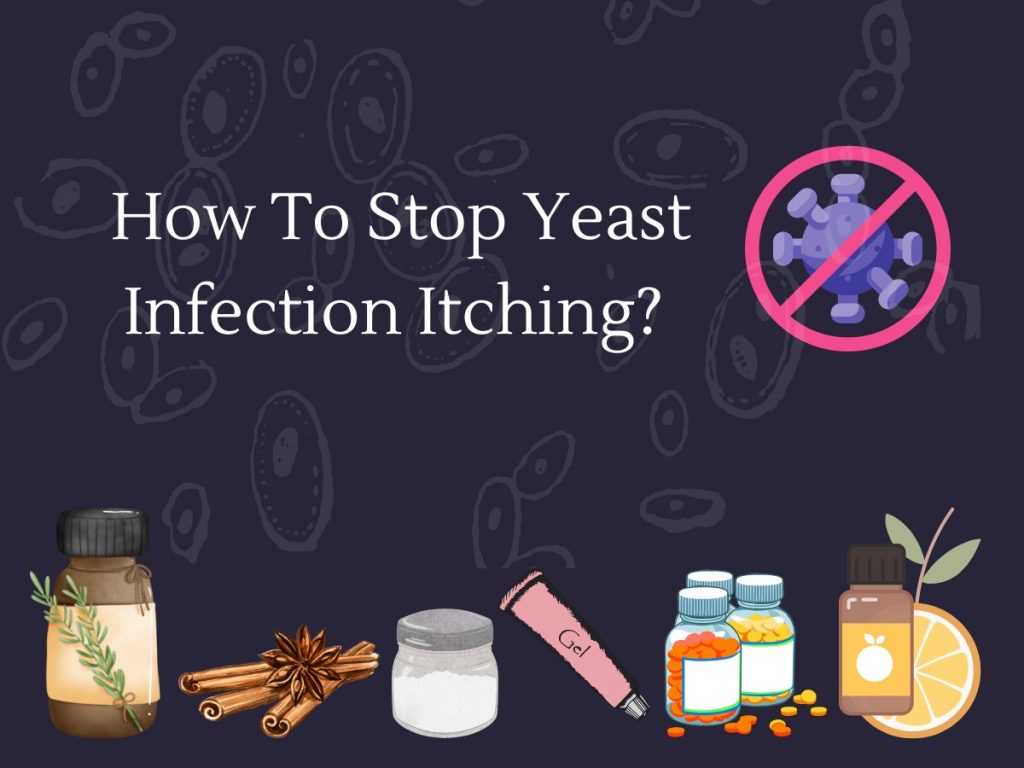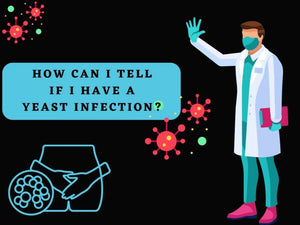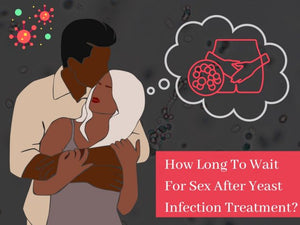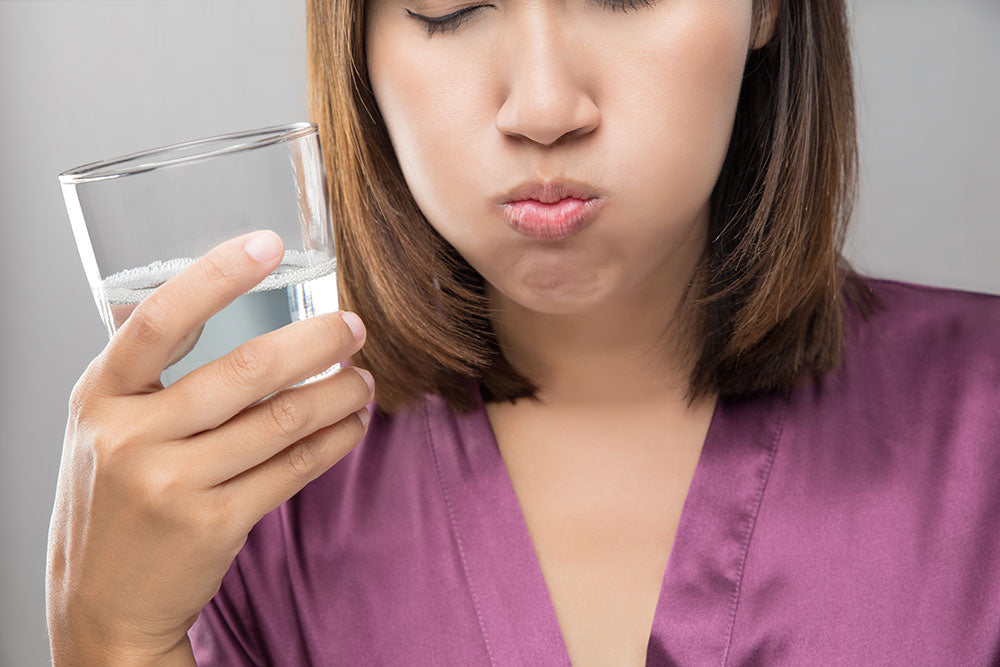Yeast infections can occur in both men and women. Nevertheless, it\’s more common in females owing to the difference in anatomy and physiology. In either sex, yeast infection is caused by an overgrowth of a fungus known as Candida albicans which usually resides in our body but becomes vulnerable under unfavorable conditions. In females, it is vaginal candidiasis; in males, it is an infection that leads to a condition known as balanitis.

Yeast infection is characterised by redness, itchiness, inflammation, burning, and unusual discharge with an offensive odour and appearance like thick cottage cheese. Moreover, patients may experience pain during intercourse and urination. There are many causes of this common infection, and so are the home remedies for how to stop yeast infection itching. Here’s, you’ll find all solutions.
What Causes Yeast Infection?
- Using antibiotics that can kill good bacteria in the reproductive tract can lead to fungal overgrowth.
- You might weaken your immune system due to HIV/AIDS and other infections like UTIs.
- You have higher than average sugar levels in your urine and vaginal mucus due to suffering from Diabetes Mellitus.
- Hormonal imbalance during pregnancy, lactation, or menopause
- Stress that alters hormonal production
- Using scented and chemical-laden products like vaginal sprays or douches
- Unprotected sex with a partner having a yeast infection
- Practising unhygienic conditions
- Wearing tight, nylon/silk undergarments
- Wearing damp clothes
How To Stop Yeast Infection Itching?
Following are the popular and effective home remedies, alternative therapies like essential oil serum, and OTC medications that can be your saviour for how to stop itching from yeast infection.
The Goodbye Company Yeast Infection Essential Oil Serum
The Goodbye Company yeast infection essential oil serum is the best and most rapid solution to your problem of how to make yeast infection stop itching. It\’s nature’s bounty to help heal yeast infections and improve the health of the reproductive tract. This serum is formulated with cinnamon and clove oil and infused in a propriety blend of omega 9 essential oils making it the ultimate saviour of how to stop yeast infection itching.

Cinnamon is well-known for its anti-inflammatory, antibacterial, and antifungal properties. In addition, cinnamon helps maintain sugar levels and increases insulin sensitivity to manage diabetes- one of the causes of yeast infection. Similarly, clove oil regulates sugar levels and is antibacterial. Apply 3-5 drops of this serum to the affected area. Moreover, this organic serum thrice or five times a day is used for the best results. Males and females infected with yeast can use it comfortably.
Hygiene:
Hygiene is the best preventive measure one can adopt to avoid yeast infections. When washing the vaginal area, remember that less is more. It is because vaginal discharge and good bacteria inside the vagina help regularly cleanse and maintain pH. Therefore, one should use only a few scented and artificial products in sensitive body areas. Regularly take a bath using mild or organic soap to avoid vaginal dryness and itching.
Greek Yogurt:
Probiotics are the most effective solution for how to stop yeast infection itching. These are the excellent and protective bacteria that kill and inhibit the overgrowth of Candida albicans and maintain a good gut microbiome balance. Therefore, you can have yogurt and, more precisely, Greek yoghurt to have an excellent probiotic source.
According to a study conducted in 2017 on the effect of ingestion of yoghurt in vulvovaginal candidiasis among women, yoghurt contains bacteria known as Lactobacillus acidophilus that enhance a good bacteria population. However, ensure that your yogurt does not contain added sugars, fruity essence, fresh fruits, frozen fruit chunks, or artificial flavors. Furthermore, eat a bowl of Greek yogurt daily.
Other Probiotic Foods:
Though yoghurt is the best solution how to stop itching from yeast infection, you can also have other foods if you don’t like eating yoghurt. These include:
- Kefir
- Kimchi
- Sauerkraut
- Tempeh
- Miso
- Kombucha
- Buttermilk
- Natto
- Gouda, mozzarella, cottage, and cheddar cheese
Probiotic Supplements:
You can also have probiotic supplements if you don’t want to consume yoghurt or do not have access to Japanese foods rich in probiotics. These supplements come as powders to be reconstituted before administration, suppositories, or pessaries. Oral supplements take about ten days to properly work against yeast infection, whereas pessaries give quick results. In addition, you can buy them from any pharmacy or drugstore.
Apple Cider Vinegar Bath:
Apple cider vinegar has many health benefits, as it helps lower sugar levels and is an excellent antiseptic. You can use it for bathing and include it in your diet. Add a half cup of apple cider vinegar to a bathtub full of lukewarm water for bathing and soaking for about 15–20 minutes. Its acidic nature can help inhibit the overgrowth of Candida and maintain vaginal pH. Moreover, remember not to use it for douching.
Baking Soda Bath
A baking soda bath is also one of the most common solutions for the problem of how to stop itching from yeast infection. According to a study conducted in 2012 investigating the antifungal activity of sodium bicarbonate, baking soda is a potent antifungal that can kill fungal cells, including Candida albicans. Experts advise adding a quarter cup of baking soda to the bathtub for the best results. Moreover, you can also make a paste and apply it on the affected area, then wait for 5 to 10 minutes and follow thorough washing.
Boric Acid:
When no other medication or home remedy works, boric acid can be used as a saviour to stop itching from yeast infection. Boric acid is a potent antiseptic yet toxic in large amounts since it can damage the kidney or cause a circulatory collapse in case of maximum absorption. Pregnant females and people with susceptible skin cannot use boric acid. Therefore, some individuals can use boric acid suppositories with precautions and other medications to solve the problem of how to stop external itching from yeast infection.
Coconut Oil:
Coconut oil is another best natural source of antifungal agents fresh from the coconut tree. Some research has shown that coconut oil effectively kills Candida albicans. You can apply fresh coconut oil to the vaginal area and leave it on; it requires no after-washing. Moreover, it also prevents vaginal dryness and hydrates the area.
Oregano Essential Oil:
Oregano essential oil is another home remedy for the problem of how to stop yeast infection from itching. According to numerous studies, essential oregano oil can effectively kill Candida albicans and thus can prevent yeast infection itching. Nonetheless, you should not use it in pyre form; instead, mix 3-5 drops of it in an ounce of carrier oil like coconut oil, almond oil, or olive oil for maximum penetration and a soothing effect. You can also apply the mixture to the tampon and insert it into the vaginal cavity but don\’t forget to change it every two hours. Also, do a sensitivity test on your skin before applying directly to the affected area.
Tea Tree Oil:
Tea tree oil is also an excellent antifungal agent that has been recognised as a promising remedy to treat yeast infections and inhibit the overgrowth of numerous fungal species, including Candida. Tea tree oil is also an essential oil that you should not use directly on the skin. Therefore, use it like the oregano oil previously discussed and conduct an allergic reaction test. For this test, apply a diluted tea tree oil in any carrier oil and leave it on the skin for about half a day. If there are no signs of rash, use it regularly for the best results. Moreover, you can also use tea tree oil capsules or pessaries designed to insert into the vaginal cavity.
Garlic:
With references from many research, garlic is an excellent antifungal and antiseptic agent. It is pretty effective in killing Candida albicans. Nevertheless, inserting a garlic clove into the vagina is not recommended since other active principles in garlic can burn and irritate sensitive skin. Therefore, incorporate garlic into your diet and consume it daily to boost your immunity.
Vitamin C:
Ascorbic acid, commonly known as Vitamin C, is a potent antiseptic with many health benefits like strengthening immunity and boosting the function of immune cells to kill Candida attacking normal physiology. Since it is an acid, do not apply vitamin C directly on the skin; instead, mix it with other home remedies like aloe vera gel or carrier oils infused with compatible essential oils. Moreover, try incorporating vitamin C into your diet. Natural and fresh sources include green vegetables and citrus fruits. However, you can also take Vitamin C supplements like tablets and powders for reconstitution.
Vitamin E:
Vitamin E is also beneficial for the problem of how to make yeast infection stop itching. Vitamin E suppositories are readily available at pharmacies and drug stores that you can use to reduce inflammation associated with a yeast infection. Apply it thrice daily for about 14 days for the best outcomes.
OTC Medications:
Over-the-counter medications include antifungals, antiseptics, analgesics, and antiallergics. These medications are available in many different dosage forms like tablets, capsules, powders, gels, ointments, creams, pastes, suppositories or pessaries. Some of them are enlisted below.
Antifungal Cream:
Many antifungal creams are available, both OTC and upon prescription, and are excellent and potent in treating numerous yeast infections. The most popular product is Monistat 1 Combination pack that contains Miconazole. Other antifungals are:
- Ketoconazole
- Fluconazole
- Clotrimazole
- Econazole
- Tioconazole
- terbinafine
These medications are also combined with steroids. Moreover, these are recommended with cortisone creams for the problem of how to immediately stop itching from yeast infection.
Cortisone Gel:
Cortisone gel containing hydrocortisone is a topical OTC medication to treat yeast infection itching. Apply it according to the labelled instructions for maximum benefits and avoidance of side effects.
Oral Antihistamines:
Oral antihistamines like loratadine or desloratadine effectively reduce itchiness associated with a yeast infection. It does not treat the underlying cause but provides temporary relief from redness and itchiness.
Hydrogen Peroxide:
Hydrogen peroxide, produced by the lactobacillus- the good bacteria in the vaginal cavity, has antiseptic properties. There is no substantial evidence to support the use of hydrogen peroxide to stop itching from yeast infection, but some users have claimed its efficiency. You can use it to wash the vaginal area thoroughly. However, do not douche with hydrogen peroxide; it will also wash away the good bacteria.
Cold Compress:
Cold compress is a temporary home remedy that can reduce inflammation and itchiness by causing numbness in the area. You can apply a cold compress by taking a plastic zipper bag or a cloth bag filled with ice cubes. Place it on the affected area thrice or four times daily. Moreover, you can also take a cool bath to help soothe itchiness from yeast infection.
Cotton And Loose-Fit Undergarments:
Considering clothing is a part of lifestyle modifications. In this case of yeast infection itchiness, consider wearing loose-fit undergarments made of pure cotton since wearing nylon or silk stuff can aggravate the itchiness by absorbing vaginal/ penile discharge and microbes in the fabric fibres.
Alert!
Seek immediate medical attention and stop using any home remedy if;
- You feel pain or burning during urination
- You feel pain or bleed after intercourse
- Severe pain in the pelvic region
- Yellowish green or grey vaginal discharge with an offensive odour
- Blisters inside and outside the vagina
- Extreme swelling in the reproductive tract
Avoid!
- Using scented female products
- Talcum powders
- Vaginal sprays
- Douches
- Excessive sugar intake
- Wearing nylon/silk undergarments
- Wearing tight tights or jeans
- Wearing damp clothes
- Using antibiotics without appropriate indications
FAQs
What Is The Best And Most Rapid Way To Reduce Yeast Infection Itching?
The best and the most rapid way to reduce itching from a yeast infection is by using antifungal creams with cortisone gels and The Goodbye Company yeast infection serum oil.
Can My Yeast Infection Heal On Its Own?
Some yeast infections are so mild that they heal independently, whereas some infections become aggravated and cannot be left untreated. If you leave them unmanaged, they can reach systemic circulation.
How To Stop Yeast Infection Itching Naturally?
Above mentioned are all approved home remedies you can follow to eliminate itchiness due to yeast infection. Nevertheless, consult a physician in exceptional cases, like if you are pregnant or have other health concerns.
How To Stop External Itching From A Yeast Infection?
You can use apple cider vinegar, baking soda, tea tree oil, oregano oil, or vitamin E to stop external itching from yeast infection.
How Long To Stop Itching Yeast Infection?
It requires about three days to heal a yeast infection. Nevertheless, it depends on the treatment choice and severity of the infection for the healing process to be completed.
What Does Yeast Infection Itching Feel Like?
It\’s like a burning sensation and an excessive urge to scratch the area due to itchiness. However, the inflammation has made the area tender, so it\’s an excruciating feeling.
How Long Is Yeast Infection Itching?
Yeast infection is caused by a fungus known as Candida Albicans that proliferates; in almost 90 mins, it doubles. Therefore, the infection can spread and cause itchiness that will become aggravated over time. Once diagnosed, it can heal in a minimum of 3 to 14 days.
How Do I Check Myself For Yeast Infection Itching?
You can check the swelling in the area, vaginal discharge texture and odour, and can feel itchiness and pain to confirm you get a yeast infection.
Summing Up
Though home remedies are easy, accessible, and most natural ingredients that help you heal yeast infection itching, these are not strictly monitored by FDA for safety, efficacy, quality, and purity standards. Therefore, if you try an alternative therapy, consult your physician and double-check the quality of the product you choose and from where you buy that. Moreover, pay special attention if you are pregnant, lactating women, or suffering from other severe infections before using any herb or condiment. Always remember that the response to home remedies varies from individual to individual and the healing time depends on treatment choice and severity of the infection. Lastly, if you have recurrent infections, seek immediate medical attention.














Vicky Moore —
Living with Herpes simplex was depression for me even with my doctor’s advice and medication. My name is Vicky Moore I live in Chicago, Illinois and this is my story. I browsed the Internet in search of remedies or something but unfortunately nothing new, all still had the same results. Sadly I almost quit on myself, it was around 7:30 in the morning when my therapist called me over to her house, at first I was skeptical, but I went anyways on getting there she was smiling and said there’s living proof now, she showed me a lady who also suffered from herpes simplex 3years back and now she is cured by a doctor who also studied natural herbs. I was amazed and lost for words I even doubted but showed me a doctor’s report test. So I contacted the doctor and weeks later, I was cured. So I would love to use this medium to say a big thank you to my therapist and Dr. Chalopa. This story is shared to others like me out there. However, he also treats other illnesses.
Email (drchalopa@gmail.com)
DEBBY ROBERT —
I have been suffering from a deadly disease (HSV2) for the past 2 years now, I have spent a lot of money going from one place to another, from churches to churches, hospitals have been my home every day residence. Constant checks up have been my hobby not until this faithful day, i was searching through the internet, i saw a testimony on how Dr AGBON helped someone in curing his (HSV2) herpes disease, quickly I copied his email which is dragboherbalhome@gmail.com just to give him a test I spoke to him, he asked me to do some certain things which i did, he told me that he is going to provide the herbal cure to me, which he did, then he asked me to go for medical checkup after some days after using the herbal cure, behold i was free from the deadly disease, he only asked me to post the testimony through the whole world, faithfully am doing it now, please brothers and sisters, he is great, I owe him in return. if you are having a similar problem just Contact him now WhatsApp Number +2349058797761, Gmail: dragboherbalhome@gmail.com, Website: https://dragbonherbalhome.wixsite.com/my-site-3
Spell/herbal solution —
looking for a spell or herbal remedy for any diseases?
Pregnancy Spell to Conceive a Baby,
Goodluck spell,
Lotto spell,
spell to restore your marriage,
If you want to stop your divorce.
cure for herpes,
cure for diseases like (HIV), (CANCER) or any illness.
e.t.c
Contact us directly on Email: osazu_spell@outlook.com
telegram -— https://t.me/solution59